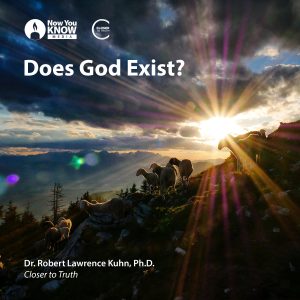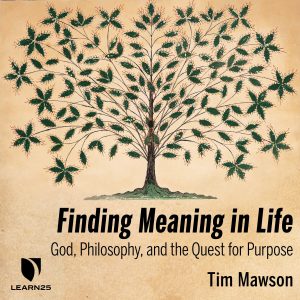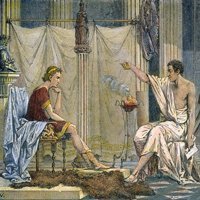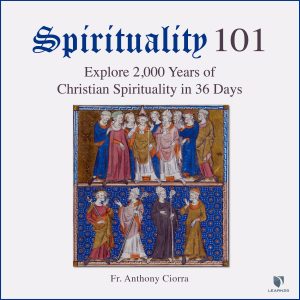Join one of Catholicism’s leading living philosophers in exploring the great minds who tackled the universe’s biggest questions.
Award-winning professor Fr. Harry J. Gensler, SJ, a leading authority on Catholic philosophy, introduces you to the thinkers whose ideas and faith shaped history.
From antiquity to the Information Age, humankind has grappled with big questions. Pondering issues such as the problem of evil, the coexistence of faith and reason, and the mystery of creation is what makes us human. This fascinating audio course takes you through two millennia of a rich philosophical tradition. You’ll encounter giants like Augustine and Aquinas as well as lesser-known minds whose wisdom will enlighten you in equal measure.
First, you’ll explore the Bible and works by Greek philosophers whose ideas influenced Christian thinkers. Moving chronologically, you’ll then see how schools of Catholic thought built upon each other throughout the centuries. As you journey through the Patristic Era, the Middle Ages, the Enlightenment, and into the modern day, you’ll explore questions about prayer, suffering, and the ultimate destiny of humankind.
Read More
Join one of Catholicism’s leading living philosophers in exploring the great minds who tackled the universe’s biggest questions.
Award-winning professor Fr. Harry J. Gensler, SJ, a leading authority on Catholic philosophy, introduces you to the thinkers whose ideas and faith shaped history.
From antiquity to the Information Age, humankind has grappled with big questions. Pondering issues such as the problem of evil, the coexistence of faith and reason, and the mystery of creation is what makes us human. This fascinating audio course takes you through two millennia of a rich philosophical tradition. You’ll encounter giants like Augustine and Aquinas as well as lesser-known minds whose wisdom will enlighten you in equal measure.
First, you’ll explore the Bible and works by Greek philosophers whose ideas influenced Christian thinkers. Moving chronologically, you’ll then see how schools of Catholic thought built upon each other throughout the centuries. As you journey through the Patristic Era, the Middle Ages, the Enlightenment, and into the modern day, you’ll explore questions about prayer, suffering, and the ultimate destiny of humankind.
Although Catholic philosophers differed in their approaches, they shared common beliefs in God, free will, and morality. Above all, they believed in the compatibility of faith and reason. As you meet these great philosophers, you will deepen your understanding of human nature and life’s ultimate questions.
This course is part of the Learn25 collection.
This course was previously published as Great Catholic Philosophers
Learn about downloadable programs.
$24.99




You must be logged in to post a review.
© 2021 Learn 25 | Privacy Policy | Terms of Use | MP3 Downloads | Customer Support
Stay in the know.
Enter your email address for a free coupon, and to find out about future specials and promotions. You may unsubscribe at any time.


In an effort to provide our customers the best possible experience, we have created a new website for you at Learn25.com to browse our selection of over 400 audio and video courses by top professors.
Timothy –
Good study of the arguments for the existence of God
I expected a wider range of Catholic Philosophical topics but the two focused on were very good. The most covered topic was the existence of God arguments. The full range of arguments were covered and the objections to each argument and the strength of the argument and objection considered. The second topic was a defense of Christianity in general and Catholocism in specific. This was best handeled by a review of Plantinga. I take a different view of many of the philosophers presented. Augustine is presented through the eyes of “TheConfessions” and I prefer “Civitas Dei”. “Civitas Dei” presents a very thourough defense of Christianity agains pagan allegations. I disagree with his treatment of Galileo as a victim of petty politic instead of a cruel and underhanded poltroon who provided no evidence for his assertions which are not scientifically justified until 100 years after his death. I never think of Descartes as a Catholic philosopher. I think what really got him into trouble is that her turned Aristotle on his head by denying the primacy of sense data and inserting the notion of clear and distinct ideas which are neither clear no distinct. The sad fact is that no Catholic philosophers at that time were available to straighten out the mess Thomism was in. It has become corrupt and confusing. Even at their clearest, Aristotle and Aquinas are difficult. Descartes, Locke and Hume are easy and pursuasive. Also physicas and Chemistry are lots more fun to do than Aristotle. I wish more was said about Pascal as his faith was great and supported his reason. I wish he had included Maritan and Gilson. They are giants in the best Catholic tradition. I am especially indebted to Gilson for the insight that the gift of Descartes to Nietzsche is they explore all the fruitless rabbit holes philosophy can fall down.
Tamara –
Brilliant Ideas Never Die Because They are Engraved in The Memory of Time
An intellectually intense and exceptional work on the great masterminds of Christian philosophy by whom I consider one of the most brilliant minds of our time.
I had the pleasure and privilege of being one of Gensler’s students. It was in his Christian Thinkers class where my intellect came into conflict with Tertullian and his famous question, “What indeed has Athens to do with Jerusalem?” (Gensler & Swindal, 2005, p 62).
Excellent work Professor Gensler.
Karen Jantzi (verified owner) –
I found this lecture disorganized, patriarchal and pretentious. He mixes contemporary philosophers in with the ancients so you get very little information about the ancients. The course, at times, seems to focus on themes rather than individuals making it hard to follow. He talks about the “philosopher of the poor” and implies the poor aren’t as intelligent so can’t understand more complex philosophers. He creates a hierarchy for religions according to the number of gods in the religion. Of course, monotheism is the most evolved. I probably will not listen to the rest of the course. I wanted an overview of the philosophers listed in the course. I didn’t get that.